A revolutionary gin from Sir Isaac Newton's iconic apple tree
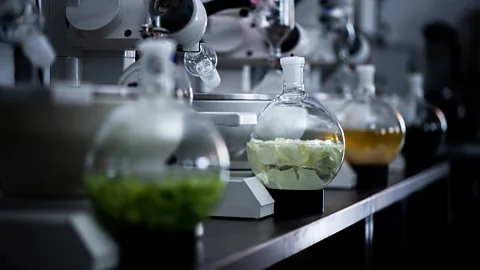 Cambridge Distillery
Cambridge DistilleryAfter more than 300 years, Newton’s law of gravitation is still palpable at a revolutionary Cambridge distillery.
On a warm January afternoon, I pedalled down cobblestone streets in Cambridge, England, to a path along the River Cam towards the village of Grantchester. Passing wooden punts in the river, through the weeping willow-fringed Grantchester Meadows, a setting that's inspired many an artist, including Pink Floyd, I set out in search of a spirit with a certain pull.
But what I found instead was a gin with gravitas.
Inside a white-brick building, I entered the lofty Cambridge Distillery, which offers tastings as well as a peek into the inner workings of what's been called "the world's most innovative distillery". With beakers, round-bottom flasks and white tables, the distillery looks more like a chemistry lab than a traditional distillery outfitted with copper alembic stills.
Named after its namesake English hometown, Cambridge Distillery was founded by William and Lucy Lowe in 2012. The company has since grown from the UK's smallest distillery to one of the largest dedicated vacuum gin distilleries in the world.
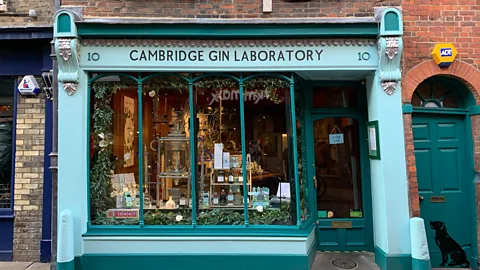 Erin Levi
Erin LeviUnlike the average distiller, William is a Master of Wine, a distinguished title held by just 416 people around the world. (He's also an Ironman triathlete, a Kung Fu black belt and now a Master Distiller and PhD student at Cambridge.) Inspired by oenology and driven by a desire to bottle the seasonal scents and flavours of the surrounding Grantchester Meadows, William has revolutionised gin-making by vacuum distilling each ingredient individually at the optimal temperature. He does this by using a 17th-Century method from British chemist Robert Boyle to blend and customise each gin to perfection, much like a perfumer or master wine maker – hence his moniker "the world's first gin tailor".
He also developed a unique distillation matrix that considers nine variables (including temperature, timing and pressure) to customise the treatment for each bottle, which is why the distillery looks like a lab. "It's an incredibly high technological level of intervention in order to preserve that natural and unique combination of flavours, which naturally exist in a meadow," said William.
WORLD'S TABLE
BBC.com's World's Table "smashes the kitchen ceiling" by changing the way the world thinks about food, through the past, present and future.
As such, the distillery is renowned for producing some of the world's most unique gins, including one derived from red wood ants foraged from Kent (cleverly named Anty Gin) in collaboration with Nordic Food Lab, as well as a citrus-led gin that contains no citrus, and a custom gin for a client who wanted a "wet dog smell".
They're also the only distillery in the world that crafts gin flavoured by Sir Isaac Newton's apple tree.
Developed in exclusive collaboration with Cambridge University Botanic Garden (CUBG), the spirit, known as Curator's Gin, features rare botanicals like lemon lavender, ginger rosemary and crisp apples from Newton's legendary tree. The citrus, spicy and herbaceous notes fuse into floral fragrance, according to William.
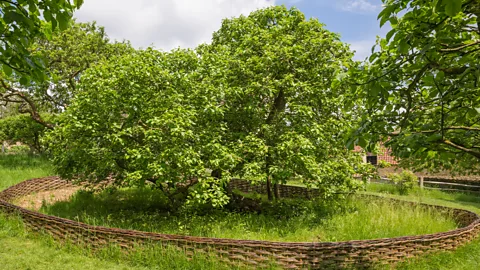 Woolsthorpe Manor
Woolsthorpe Manor"Being let loose in their garden was quite a treat," said Lucy. "It felt ever so naughty to be picking things."
The tree is actually a descendent (a clone, technically) of Newton's tree in Woolsthorpe Manor in Lincolnshire, England, Newton's birthplace and family home where allegedly he made his original observation of gravity, among other major discoveries. The apple-falling brainstorm happened in 1665 or 1666 while the University of Cambridge, where he was a mathematics student (and later a professor), was closed due to the bubonic plague. (His theory of gravity, sans apples, was published in his Principia in 1687, and is at the Cambridge University Library.)
"In the last two years, Newton's story has resonated with a lot more people," said Emma Michalak, operations manager at Woolsthorpe Manor, who maintains one of the holiest pilgrimage sites for scientists and physicists.
While the original tree miraculously still stands and bears fruit after more than 400 years – a true sign of resilience, even if it appears a bit warped and weighed down – its younger scion in Cambridge was razed by Storm Eunice in 2022. Luckily, the Lowes have bottled up enough of the apple essence to sustain production until the new sapling reaches maturity.
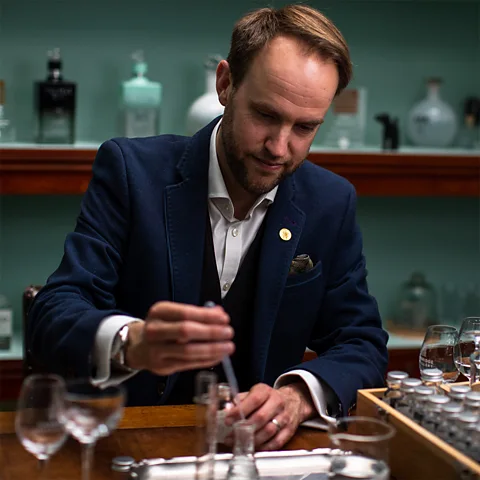 Cambridge Distillery
Cambridge DistilleryThe seeds of Newton's famous apple tree eventually spread to six continents. "Newton's tree can be found across the globe, from America to Japan," said Michalak. Many of those outside of the UK and Europe, however, are scions of scions.
The tree at Woolthorpe flowers in mid- to late-May, and apples are ripe from October. While visitors aren't allowed to pick them, they can take the windfalls. On occasion, the gift shop sells them for 50p each. But don't get too excited. "A lot of people buy them to try and grow their own Newton's apple tree from the seed," said Michalak. But "the way cross pollination works, that apple seed could be any type of apple that grows. It wouldn't necessarily be a Flower of Kent."
Instead, Michalak recommends baking a pie with the apples that inspired Newton.
Cambridge Distillery's collaboration with CUBG continues to be fruitful and inventive. "Not to one-up our Curator's Gin, but we also have gin that's inspired by [Charles] Darwin," said William.
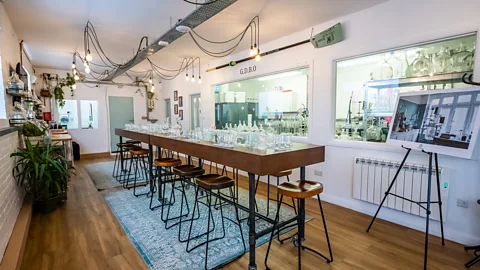 Cambridge Distillery
Cambridge Distillery"What most people don't know is that there is a secret level under the Botanic Garden," said William, "concealing some incredibly valuable and important storage." This includes the Cambridge University Herbarium, which contains roughly 1,000 200-year-old specimens from Darwin's around-the-world Beagle voyage between 1831-36.
"When Darwin was on this voyage, collecting, indexing and recording [plant] samples he was finding along the way, those samples were being sent back to [his mentor John Stevens Henslow at] Cambridge, and they're still there, all of them," said William. The Lowes were offered the extraordinary chance to explore the Herbarium through the "medium of flavour" and create a gin that brought Darwin's 19th-Century world voyage – the trip that inspired his view of evolution – to life.
More like this:
• The Arctic circle: A new frontier for sustainable wine
The first gin released from the three-part Darwin series was the Americas Herbarium in November 2023, which will be followed by Australasia (December 2024) and Africa (2025). The Lowes, together with CUBG professor of evolution Sam Brockington, selected cinnamon leaf, barberry (a zesty citrus alternative), wild strawberry and baccharis magellanica (an Andean shrub from southern Argentina and Chile with intensely aromatic flowers dubbed the "Christmas Bush"), to represent the first leg of Darwin's epic journey. As William explained, it coalesces in a full bouquet of flavour: floral, sweet, crisp and fruity with a comforting hint of spice.
After an hour savouring Cambridge Distillery's many creations, I cycled back to my hotel with a bottle of gin dangling from the handlebar in a brown paper bag. The clouds began to break, releasing a drizzle that quickly became a downpour. I rode as fast as possible, trying to cover the paper bag with my jacket. When I finally got to my hotel, the bag, which was inevitably soaked, tore apart. I snatched the bottle before it fell like an apple to the earth, saving it from Newton's Law.
--
If you liked this story, sign up for The Essential List newsletter – a handpicked selection of features, videos and can't-miss news, delivered to your inbox twice a week.
